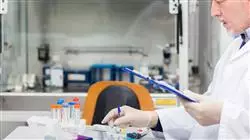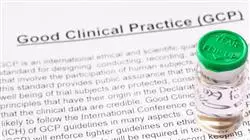University certificate
The world's largest faculty of medicine”
Introduction to the Program
Join our team of students and specialize in clinical trials, an area of research that is constantly growing"

This Postgraduate diploma in Clinical Trials Coordination is designed for students to acquire the necessary skills and abilities so that there can be no errors in this part of the process. The investigator's file should contain all the documentation relating to the research team (curriculum vitae and other relevant documents showing the qualifications of the investigators) and the patient (informed consents, recruitment measures, monitoring visits), the study protocol, the investigator's manual, a model of the data collection notebook, and the different laboratory and safety procedures, and should therefore be kept in an appropriate manner.
To this end, this training will discuss the importance of the researcher's file, the documents it should contain, how they should be filed, how they should be completed and how long they should be kept.
On the other hand, in recent years the figure of clinical trial coordinator has become a fundamental and essential part of a research unit. There is an increasing demand from developers for a person to organize the research team and to serve as a link between the pharmaceutical industry and the research center itself. In this sense, this Postgraduate diploma also analyzes the figure of the clinical trial coordinators, as well as their main responsibilities, the vital importance of the trial process and everything that surrounds it.
Finally, the program focuses on the follow-up of patients in the context of a clinical trial, both in Specialized Care and in hospitalization. For this purpose, the different visits defined in the protocol are established, as well as the most frequently used materials (questionnaires, treatment adherence books, symptom cards, electronic devices, etc.).
It is also important for the healthcare professional to be aware of the complications that can arise in patients who participate in these types of studies in order to deal with them, as well as to learn how to develop strategies to prevent participants from dropping out of these trials.
The goal of healthcare is to achieve a cure for diseases and a better quality of life for patients. Investing in research is important, but so is having specialized professionals"
This Postgraduate diploma in Clinical Trials Coordination contains the most complete and up-to-date scientific program on the market. The most important features include:
- The development of practical case studies presented by experts in Clinical Trials Coordination
- The graphic, schematic, and practical contents with which they are created, provide scientific and practical information on the disciplines that are essential for professional development
- New developments in Clinical Trials Coordination
- Practical exercises where self-assessment can be used to improve learning
- Special emphasis on innovative methodologies in Clinical Trials Coordination
- Theoretical lessons, questions to the expert, debate forums on controversial topics, and individual reflection assignments
- Content that is accessible from any fixed or portable device with an internet connection
This Postgraduate diploma is the best investment you can make when selecting a refresher program for two reasons: in addition to updating your knowledge in Clinical Trials Coordination, you will obtain a qualification endorsed by TECH Global University"
The teaching staff includes professionals from the Health sector, who bring their experience to this training program, as well as renowned specialists from leading societies and prestigious universities.
The multimedia content, developed with the latest educational technology, will provide the professional with situated and contextual learning, i.e., a simulated environment that will provide immersive training programmed to train in real situations.
This program is designed around Problem-Based Learning, whereby the health professional must try to solve the different professional practice situations that arise throughout the program. For this purpose, the professional will be assisted by an innovative interactive video system developed by renowned and experienced experts in the field of Clinical Trials Coordination.
Do not hesitate to take this training with us. You will find the best teaching material with virtual lessons"

This 100% online Postgraduate diploma will allow you to balance your studies with your professional work while expanding your knowledge in this field"
Why study at TECH?
TECH is the world’s largest online university. With an impressive catalog of more than 14,000 university programs available in 11 languages, it is positioned as a leader in employability, with a 99% job placement rate. In addition, it relies on an enormous faculty of more than 6,000 professors of the highest international renown.

Study at the world's largest online university and guarantee your professional success. The future starts at TECH”
The world’s best online university according to FORBES
The prestigious Forbes magazine, specialized in business and finance, has highlighted TECH as “the world's best online university” This is what they have recently stated in an article in their digital edition in which they echo the success story of this institution, “thanks to the academic offer it provides, the selection of its teaching staff, and an innovative learning method aimed at educating the professionals of the future”
A revolutionary study method, a cutting-edge faculty and a practical focus: the key to TECH's success.
The most complete study plans on the university scene
TECH offers the most complete study plans on the university scene, with syllabuses that cover fundamental concepts and, at the same time, the main scientific advances in their specific scientific areas. In addition, these programs are continuously being updated to guarantee students the academic vanguard and the most in-demand professional skills. In this way, the university's qualifications provide its graduates with a significant advantage to propel their careers to success.
TECH offers the most comprehensive and intensive study plans on the current university scene.
A world-class teaching staff
TECH's teaching staff is made up of more than 6,000 professors with the highest international recognition. Professors, researchers and top executives of multinational companies, including Isaiah Covington, performance coach of the Boston Celtics; Magda Romanska, principal investigator at Harvard MetaLAB; Ignacio Wistumba, chairman of the department of translational molecular pathology at MD Anderson Cancer Center; and D.W. Pine, creative director of TIME magazine, among others.
Internationally renowned experts, specialized in different branches of Health, Technology, Communication and Business, form part of the TECH faculty.
A unique learning method
TECH is the first university to use Relearning in all its programs. It is the best online learning methodology, accredited with international teaching quality certifications, provided by prestigious educational agencies. In addition, this disruptive educational model is complemented with the “Case Method”, thereby setting up a unique online teaching strategy. Innovative teaching resources are also implemented, including detailed videos, infographics and interactive summaries.
TECH combines Relearning and the Case Method in all its university programs to guarantee excellent theoretical and practical learning, studying whenever and wherever you want.
The world's largest online university
TECH is the world’s largest online university. We are the largest educational institution, with the best and widest online educational catalog, one hundred percent online and covering the vast majority of areas of knowledge. We offer a large selection of our own degrees and accredited online undergraduate and postgraduate degrees. In total, more than 14,000 university degrees, in eleven different languages, make us the largest educational largest in the world.
TECH has the world's most extensive catalog of academic and official programs, available in more than 11 languages.
Google Premier Partner
The American technology giant has awarded TECH the Google Google Premier Partner badge. This award, which is only available to 3% of the world's companies, highlights the efficient, flexible and tailored experience that this university provides to students. The recognition as a Google Premier Partner not only accredits the maximum rigor, performance and investment in TECH's digital infrastructures, but also places this university as one of the world's leading technology companies.
Google has positioned TECH in the top 3% of the world's most important technology companies by awarding it its Google Premier Partner badge.
The official online university of the NBA
TECH is the official online university of the NBA. Thanks to our agreement with the biggest league in basketball, we offer our students exclusive university programs, as well as a wide variety of educational resources focused on the business of the league and other areas of the sports industry. Each program is made up of a uniquely designed syllabus and features exceptional guest hosts: professionals with a distinguished sports background who will offer their expertise on the most relevant topics.
TECH has been selected by the NBA, the world's top basketball league, as its official online university.
The top-rated university by its students
Students have positioned TECH as the world's top-rated university on the main review websites, with a highest rating of 4.9 out of 5, obtained from more than 1,000 reviews. These results consolidate TECH as the benchmark university institution at an international level, reflecting the excellence and positive impact of its educational model.” reflecting the excellence and positive impact of its educational model.”
TECH is the world’s top-rated university by its students.
Leaders in employability
TECH has managed to become the leading university in employability. 99% of its students obtain jobs in the academic field they have studied, within one year of completing any of the university's programs. A similar number achieve immediate career enhancement. All this thanks to a study methodology that bases its effectiveness on the acquisition of practical skills, which are absolutely necessary for professional development.
99% of TECH graduates find a job within a year of completing their studies.
Postgraduate Diploma in Clinical Trials Coordination
The development of products, drugs and/or diagnostic techniques is subject to an arduous scientific research process that consists of several phases. Among these is the clinical trial, one of the most relevant stages for the successful development of a project. By means of the evaluation that is carried out through studies applied to people, the aim is to verify the safety, efficacy and guarantees that these will have with their subsequent application or use. Due to the responsibility involved in the execution of these tests, it is necessary to have a team of professionals who are highly trained in skillfully assisting this field of medicine. At TECH Global University we designed the Postgraduate Diploma in Clinical Trial Coordination, a program that will allow you to expand your knowledge and skills within this discipline.
Become a trial coordinator in clinical research.
The main objective of this program is to favor the specialization of medical professionals in the field of scientific research, specifically in the area of clinical trials. Thus, with the study plan they will have the opportunity to learn about the different phases that are carried out during the development of a new drug, device or treatment; they will be able to establish the basic structure of a clinical trial and identify the difference between its different classes, and they will analyze the circuit of the manufactured product, from its conception to its introduction in the market after the completion of the project. They will also study the content of a clinical research protocol, learn about the commitment involved in complying with its guidelines and understand the rights and duties of the different participating agents during this stage of project management and development.
Get your program in the largest medical school in the world.
At TECH Global University we have the most complete and innovative curriculum in the sector. With this program, you will be trained through the study and resolution of real cases in simulated environments along with the best techniques and tools focused on online learning. In this way, you will have at your fingertips a complete, concrete and highly flexible program that adjusts to the needs of our students and makes it compatible with the goals and life projects of people who are immersed in the working world.







